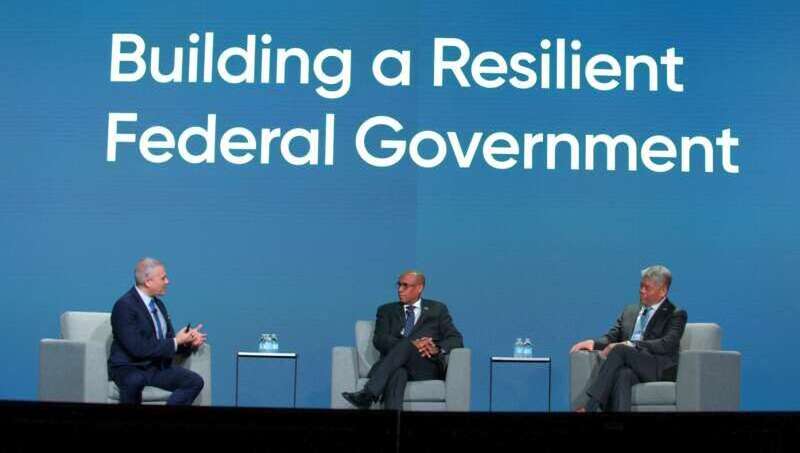
The COVID-19 pandemic forced the Federal government to make a lot of fast changes that helped agencies to build a more resilient government, according to deputy secretaries at the Departments of Veterans Affairs (VA) and Homeland Security (DHS).
At the ServiceNow Federal Forum in Washington, D.C. on March 13, VA Deputy Secretary Donald Remy and DHS Deputy Secretary John Tien shared lessons learned during the pandemic, and how they’re continuing to build resiliency at their agencies.
At DHS, Tien said his agency is looking at the future of work from the perspective of how it will best support its mission – which is to safeguard the American people, homeland, and values with honor and integrity.
When looking at “the future of work,” Tien said at his department, “we actually take a step back, take a breath, and say, ‘What is the mission?’”
“That’s how we’re trying to look at almost every single job that we have across the department,” he said. “How do we use the fact that people are more comfortable in the telework environment? How do we use the fact that we had to integrate and have operational cohesion on a level that we’ve never seen before?”
Tien said that although not every DHS employee could transition to telework during the pandemic, but the agency did jump from about 10,000 to 70,000 teleworkers.
As for the VA, Remy said that the COVID-19 pandemic helped the agency to accelerate telehealth services beyond what he thought was possible.
“During the height of the pandemic, we had to make sure that we had a vehicle to continue to provide health care to our veteran community,” Remy said. “And we needed to make sure we can provide that health care where they were.”
“And what we learned – and I was surprised, as surprised about this as anyone – is that our veteran community appreciated the ability to receive their care through telemedicine,” he continued.
“We learned that we could do things differently when we have to. And so now that we’re getting to this point in the pandemic, we’re realizing that we can practice medicine in a hybrid environment,” Remy said. “And we can provide those services that people have grown accustomed to during this time period where the veteran wants to receive them. That’s a terrific part of what we learned.”
Jonathan Alboum, the panel moderator and Federal CTO at ServiceNow, noted that “mission resilience is built into some of the lessons learned” from the pandemic, helping government agencies to accelerate their missions.
“It feels like we have a more responsive government post-COVID,” Alboum said. “It feels like we have the opportunity to deliver better for citizens.”
The deputy secretaries agreed with Alboum, and Remy noted that one lesson he’s taking away from the pandemic is that “teamwork makes the dream work.”
“What we learned during the pandemic was how the team can come together to deliver in a more efficient and more effective manner on the mission of the agency,” he said. “We’ll take all the lessons we learned by working together as a team in a stressful, challenging environment – some remote, some in-person, hybrid workforce – to continue to deliver on our mission.”
Tien concluded the panel session by pointing to the Biden administration’s Build Back Better philosophy, which he said ties into building resiliency.
“Ultimately, this is a philosophy that says that … we have a moral obligation to serve the American people. And we need to find every way that we can to be, as Don said, efficient,” he said. “And that’s why I think speaking about resilience is not just about the here and now – it’s about the future.”
